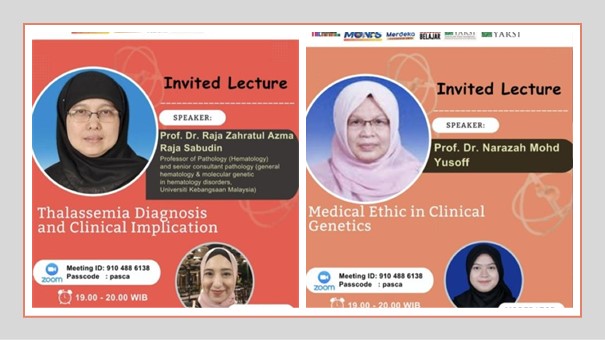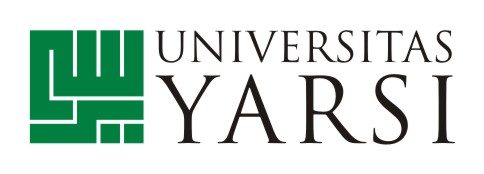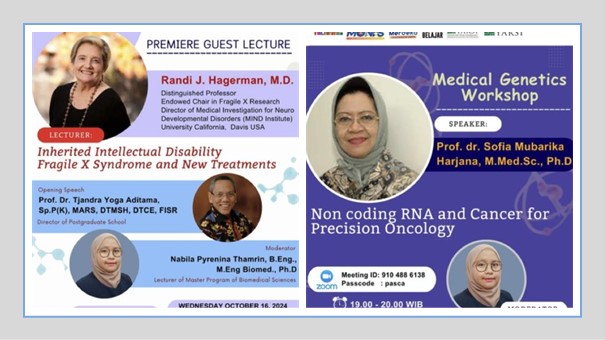In October 2024, the Master of Biomedical Sciences Program hosted four online guest lectures aimed at enhancing students’ understanding of important topics in the fields of biomedicine and medicine. The first lecture, held on October 4, 2024, was titled “Non-coding RNA and Cancer for Precision Oncology” and was delivered by Prof. Dr. Sofia Mubarika Harjana, MMed.Sc., PhD. This lecture discussed the role of non-coding RNA in cancer development and the application of precision therapy in cancer treatment. The second lecture, held on October 9, 2024, was presented by Prof. Dr. Raja Zahratul Azma Raja Sabudin on the topic “Thalassemia Diagnosis and Clinical Implications.” It covered the latest diagnostic methods for thalassemia and their clinical implications. The third guest lecture, on October 16, 2024, was titled “Medical Ethics in Clinical Genetics” and was delivered by Prof. Dr. Narazah Mohd Yusoff. This lecture addressed the ethical challenges in clinical genetics and the importance of responsible medical practice. The final lecture, held on October 16-17, 2024, was on “Inherited Intellectual Disability: Fragile X Syndrome and New Treatments,” presented by Randi J. Hangerman, M.D. This session focused on intellectual disabilities caused by Fragile X syndrome and the latest advancements in treatments for this condition.
These guest lectures are highly relevant to several points in the Sustainable Development Goals (SDGs), particularly SDG 3: “Good Health and Well-being,” which focuses on ensuring healthy lives and promoting well-being for all at all ages. The first lecture on non-coding RNA and cancer, presented by Prof. Dr. Sofia Mubarika Harjana, supports SDG 3 by introducing the concept of precision medicine in cancer treatment, which can improve treatment effectiveness and reduce unnecessary side effects. The second lecture on thalassemia diagnosis, delivered by Prof. Dr. Raja Zahratul Azma Raja Sabudin, supports SDG 3 by presenting advanced diagnostic methods and educating students about the importance of early diagnosis for better management of genetic diseases, ultimately improving patient quality of life. The third lecture on medical ethics in clinical genetics, presented by Prof. Dr. Narazah Mohd Yusoff, is also relevant to SDG 3 as it discusses the ethical considerations in genetic medicine, ensuring that research and therapies are conducted fairly and responsibly. Finally, the lecture on inherited intellectual disabilities and Fragile X syndrome, presented by Randi J. Hangerman, M.D., supports SDG 3 by providing insights into new treatments that can improve the quality of life for individuals with genetic disorders. Overall, these guest lectures contribute significantly to advancing medical research and the application of health technologies to improve health and well-being for all.



